1 - Importance of Hajj
قَالَ عَلِيٌّ (ع): أَللٌّهُ أَللٌّهُ فِي بَيْتِ رَبِّكُمْ لاَ تَخْلُوهُ مَا بَقِيتُمْ فَإِنَّهُ إِنْ تُرِكَ لَمْ تُنَاظَرُوا.
Imam ‘Ali Ibn Abi Talib (peace be upon him) has said, “By Allah, by Allah, keep the House of your Lord in mind. Do not disregard it as long as you remain (alive) because surely if it is ignored, then He shall not look towards you (with His Mercy).”
Biharul Anwar, Volume 96, Page 16
2 - The Hajj and Focusing on Allah
عَنْ أَبِي جَعْفَرِ البَاقِرِ )ع) فِي قَوْلِ اللٌّهِ تَبَارَكَ وَ تـــَعَالـى:
} فَــفِرُّوا إِلـى اللٌّه إِنِّي لَكُمْ مِنْهُ نَذِيرٌ مُبِينٌ { قَالَ: حَجُّوا إِلـى اللٌّهِ.
It has been narrated from Abi Ja’far [Imam Muhammad Ibn ‘Ali] al-Baqir (peace be upon him) that in regards to the words of Allah, the Glorious and High:
} فَــفِرُّوا إِلـى اللٌّه إِنِّي لَكُمْ مِنْهُ نَذِيرٌ مُبِينٌ {
“So then hasten towards Allah, surely I (Muhammad) am a plain warner to you from Him.” (Suratul Dhariyat (51), Verse 50)
The Imam said, “Struggle towards Allah (perform the Hajj).”
Ma’aniul Akhbar, Page 222
3 - The Talbiyyah and the Sacrifice
عَنْ عَلِيٍّ )ع) قَالَ: نَزَلَ جِبْرَئِيلُ عَلى النَّبِيِّ )ص) فَقَالَ: يَا مُحَمَّدُ مُرْ أَصْحَابَكَ بِالْعَجِّ وَ الثَّلْجِ، فَالْعَجُّ رَفَعُ الأَصْوَاتِ بِالتَّلْبِيَّةِ وَ الثَّلْجُ نَحْرُ الْبَدَنِ.
It has been narrated from ‘Ali [Ibn Abi Talib] (peace be upon him) that he said, “Jibra’il descended to the Prophet (blessings of Allah be upon him and his family) and said to him, ‘O’ Muhammad! Command your companions al-’Ajj and al-Thalj. The ‘Ajj is to raise your voice in pronouncing the Talbiyyah (Labbayk Allahumma Labbayk) out loud, while the Thalj is to slaughter an animal (on the day of ‘Eid).”
Ma’aniul Akhbar, Page 224
4 - The Major Hajj (Hajj al-Akbar) and the Minor Hajj (Hajj al-Asghar)
عَنْ مُعَاوِيَةَ بْنِ عَمَّارِ قَالَ: سَئَلْتُ أَبَا عَبْدِ اللٌّهِ )ع) عَنْ يَوْمِ الْحَجِّ الأَكْبَرِ فَقَالَ: هُوَ يَوْمُ الْنَحْرِ وَ الأَصْغَرُ الْعُمْرَةُ.
It has been narrated by Mu’awiyah Ibn ‘Ammar that he said, “I asked Aba ‘Abdillah [Imam Ja’far Ibn Muhammad as-Sadiq] (peace be upon him) in regards to the day of the major Hajj (Hajj al-Akbar) and he said, ‘This is the day of the sacrifice (‘Eidul Qurban), while the minor Hajj (Hajj al-Asghar) is the ‘Umrah.”
Ma’aniul Akhbar, Page 295
5 - The Benefits of the Hajj
عَنِ الرِّضَا (ع) قَالَ: مَا رَأََيْتُ َشَيْئاً أَسْرَعَ غِنًّى وَ لاَ أَنْفى لِلْفَقْرِ مِنْ إِدْمَانُ الْحَجِّ.
It has been narrated from al-Ridha [Imam ‘Ali Ibn Musa] (peace be upon him) that he said, “I have not seen a single thing which makes a person free from want (financially secure) quicker, nor which is more effective in removing poverty, than continuously performing the Hajj (year after year).”
Biharul Anwar, Volume 74, Page 318
6 - Dying While on the Way to Hajj
عَنْ أَبِي عَبْدِ اللٌّهِ )ع) قَالَ: مَنْ مَاتَ فِي طَرِيقِ مَكَّةَ ذَاهِباً أَوْ جَائِياً أَمِنَ مِنَ الْفَزَغِ الأَكْبَرِ يَوْمَ الْقِيَامَةِ.
It has been narrated form Abi ‘Abdillah [Imam Ja’far Ibn Muhammad as-Sadiq] (peace be upon him) that he said, “A person who dies while proceeding towards Makkah or while returning back (from Makkah) will be protected from the great distress of the Day of Resurrection.”
Maladhul Akhyar, Volume 7, Page 223
7 - The Sanctity of the Guests of Allah
عَنْ أَبِي عَبْدِ اللٌّهِ )ع) قَالَ: أَلْحَاجُّ وَ الْمُعْتَمِرُ وَفْدُ اللٌّهِ إِنْ سَأَلُوهُ أَعْطَاهُمْ وَ إِنْ دَعُوهُ أَجَابَهُمْ وَ إِنْ شَفَعُوا شَفَعَهُمْ وَ إِنْ سَكَتُوا إِبْتَدَاهُمْ وَ يُعَوَّضُونَ بِالدِّرْهَمِ أَلْفَ أَلْفَ دِرْهَمٍ.
It has been narrated from Abi ‘Abdillah [Imam Ja’far Ibn Muhammad as-Sadiq] (peace be upon him) that he said, “Those who perform the Hajj and the ‘Umrah are the guests of Allah. If they ask Him for something, He will grant it to them; if they call upon Him then He will answer them; if they intercede (for others), their intercession will be accepted; if they remain quiet, then He will begin to speak to them; for every dirham which they spend (in their trip to the Hajj), they will receive one million dirhams in return.”
Maladhul Akhyar, Volume 7, Page 223
8 - Preparing for the Ihram
عَنْ حِمَادِ بْنِ عِيسى قَالَ: سَئَلْتُ أَبَا عَبْدِ اللٌّهِ )ع) عَنِ الْتَّهَيُّؤْ لِلإِحْرَامِ فَقَالَ: تَقْلِيمُ الأَظْفَارِ وَ أَخْذُ الشَّارِبِ وَ حَلْقُ الْعَانَةِ.
It has been narrated from Himad Ibn ‘Isa that he said, “I asked Aba ‘Abdillah [Imam Ja’far Ibn Muhammad as-Sadiq] (peace be upon him) on how to prepare for the (wearing of the) Ihram? The Imam replied, ‘(One should prepare for wearing the Ihram) by cutting the nails, trimming the moustache and shaving the pubic hair.”
Maladhul Akhyar, Volume 7, Page 307
9 - Looking at the Ka’bah
عَنِ الْبَاقِرِ )ع): مَنْ نَظَرَ إِلـى الْكَعْبَةَ لَمْ يَزَلْ يُكْتَبْ لَهُ حَسَنَةٌ وَ يُمْحى عَنْهُ سَيِئَّةٌ حَتَّى يَصْرِفُ بَصَرَهُ عَنْهَا.
It has been narrated from al-Baqir [Imam Muhammad Ibn ‘Ali] (peace be upon him) that: “As long as a person is looking at the Ka’bah, good deeds will be written (in his record) and one’s evil deeds will be erased until one turns away one’s glance (from the Ka’bah).”
Biharul Anwar, Volume 96, Page 65
10 - Intention for the Hajj
عَنْ أَبِي عَبْدِ اللٌّهِ)ع) قَالَ: أَلْحَجُّ حَجَّانِ، حَجٌّ لِلٌّهِ وَ حَجٌّ لِلنَّاسِ. فَمَنْ حَجَّ لِلٌّهِ كَانَ ثَوَابُهُ عَلى اللٌّهِ وَ الْجَنَّةُ وَ مَنْ حَجَّ لِلنَّاسِ كَانَ ثَوَابُهُ عَلى النَّاسِ يَوْمَ الْقِيَامَةِ.
It has been narrated from Abi ‘Abdillah [Imam Ja’far Ibn Muhammad as-Sadiq] (peace be upon him) that, “Hajj is of two types: Hajj for the sake of Allah and Hajj for the sake of people. A person who performs Hajj for Allah, surely his reward will be with Allah - Paradise; and a person who performs Hajj for people, surely his reward will be with people (to give him) on the Day of Resurrection.”
Biharul Anwar, Volume 96, Page 24
11 - Fasting on the Day of Tashriq in Mina
سُئِلَ الصَّادِقُ )ع): لِمَ كُرِهَ الصِّيَامُ فِي أَيَّامِ التَّشْرِيقِ؟ فَقَالَ: لأََنَّ الْقَوْمَ زُوَّارُ اللٌّهِ وَ هُمْ فِي ضِيَافَتِهِ وَ لاَ يَنْبَغِي لِلضَّيْفِ أَنْ يَّصُومَ عِنْدَ مَنْ زَارَهُ وَ أَضَافَهُ.
As-Sadiq [Imam Ja’far Ibn Muhammad] (peace be upon him) was asked, “Why is it discouraged to fast on the days of Tashriq (11th, 12th, and 13th of Dhul Hijjah)?” The Imam (peace be upon him) replied, “Since people are visiting Allah and are His guests (during these days), it is not advisable that a guest should fast in the presence of the One whom he is visiting.”
Biharul Anwar, Volume 96, Page 34
عَنِ الصَّادِقِ )ع) أَنَّهُ قَالَ: مَا سَبِيلٌ مِنْ سَبِيلِ اللٌّهِ أَفْضَلُ مِنَ الْحَجِّ إِلاَّ رَجُلٌ يَخْرُجُ بِسَيْفِهِ فَيُجَاهِدُ فِي سَبِيلِ اللٌّهِ حَتَّى يَسْتَشْهَدُ.
It has been narrated from as-Sadiq [Imam Ja’far Ibn Muhammad] (peace be upon him) who said, “There is no path from the paths of Allah which is greater than Hajj, except when a person comes out with his sword and strives in the way of Allah until he is martyred.”
Biharul Anwar, Volume 96, Page 49
13 - Reward for the Tawaf
عَنِ النَّـبِيِ ّ)ص) أَنَّهُ قَالَ: مَنْ طَافَ بِهٌذَا الْبَيْتِ إِسْـبُوعاً وَ أَحْسَنَ صَلاَةَ رَكْعَتَيْهِ غُفِرَ لَهُ.
The Noble Prophet (blessings of Allah be upon him and his family) has said, “A person who circumambulates this House (the Ka’bah) seven times and performs the two Rak’at Salat (of Tawaaf) in the best form possible will have his sins forgiven.”
Biharul Anwar, Volume 96, Page 49
14 - Hajj and the Renewal of the Pledge
قَالَ أَبُو جَعْفَرٍ )ع): وَ الْحَجْرُ كَالْمِيثَاقِ وَ إِسْتِلاَمُهُ كَالْبَيْعَةِ وَ كَانَ إِذَا إِسْتَلَمَهُ قَالَ: أَللٌّهُمَّ أَمَانَتِي أَدَّيْتُهَا وَ مِيثَاقِي تَعَاهَدَتْهُ لِيَشْهَدَلِي عِنْدَكَ بِالْبَلاَغِ.
Abu Ja’far [Imam Muhammad Ibn ‘Ali al-Baqir] (peace be upon him) has said, “The Hajr (Hajrul Aswad – the Black Stone) is like the pledge (of Allah) and rubbing the hand over it is like making a pledge of allegiance (to Allah).” Whenever the Imam (peace be upon him) would rub his hand over the Hajrul Aswad he used to say:
أَللٌّهُمَّ أَمَانَتِي أَدَّيْتُهَا وَ مِيثَاقِي تَعَاهَدَتْهُ لِيَشْهَدَلِي عِنْدَكَ بِالْبَلاَغِ
“O’ Allah! I have fulfilled my trust and have renewed my pledge so that it (the Hajr al-Aswad) can bear witness that surely I have fulfilled my responsibility.”
15 - The Success and Perpetuity of Islam
عَنْ أَبِي عَبْدِ اللٌّهِ )ع) قَالَ: لاَ يَزَالُ الدِّينُ قَائِماً مَا قَامَتِ الْكَعْبَةُ.
It has been narrated from Abi ‘Abdillah [Imam Ja’far Ibn Muhammad as-Sadiq] (peace be upon him) who said, “As long as the Ka’bah is standing, the religion (of al-Islam) will remain standing.”
Biharul Anwar, Volume 96 Page 57
16 - Philosophy Behind the Name “Al-Ka’bah”
عَنْ أَبِي جَعْفَرٍ )ع) قَالَ: قُلْتُ لَهُ: لِمَ سُمِّىَ الْبَيْتُ، بَيْتُ الْعَتِيقِ؟ قَالَ: لأََنَّهُ حُرٌّ عَتِيقٌ مِنَ النَّاسِ وَ لَمْ يَمْلِكُهُ أَحَدٌ.
It has been narrated that Abi Ja’far [Imam Muhammad Ibn ‘Ali al-Baqir] (peace be upon him) was asked, “Why is it (the Ka’bah) named Baitul ‘Atiq (the Emancipated House)?” The Imam replied: “Because this house is free and emancipated from people and was never under the ownership of anyone.”
Biharul Anwar, Volume 96, Page 59
عَنْ أَبِي عَبْدِ اللٌّهِ )ع) قَالَ: إِنَّ لِلٌّهِ عَزّ َوَ جَلَّ حُرُمَاتٌ ثَلاَثٌ لَيْسَ مِثْلَهُنَّ شَيْءٌ: كِتَابُهُ وَ هُوَ حُكْمُهُ وَ نُورُهُ وَ بَيْتُهُ الَّذِي جَعَلَهُ قِبْلَةً لِلنَّاسِ لاَ يَقْبَلُ مِنْ أَحَدٍ تَوَجُّهَا إِلـى غَيْرِهِ وَ عِتْرَةِ نَبِيِّكُمْ.
It has been narrated from Abi ‘Abdillah [Imam Ja’far Ibn Muhammad as-Sadiq] (peace be upon him) who said, “Surely Allah, the Noble and Grand, has made three things sacred and there is nothing else equivalent to them: His Book (the Qur’an) which is His Command and Divine Light; His House (The Ka’bah) which He has made as the focal point (Qiblah) and He will not accept from anyone facing any other direction; and the family of your Prophet.”
Biharul Anwar, Volume 96, Page 60
18 – Donations to Maintain the Ka’bah
عَنْ عَلِيٍّ )ع) قَالَ: لَوْ كَانَ لِي وَادِيَانِ يَسِيلاَنِ ذَهَباً وَ فِضَّةً مَا أَهْدَيْتُ إِلـى الْكَعْبَةِ شَيْئاً لأََنَّهُ يَصِيرُ إِلـى الْحَجْبَةِ دُونَ الْمَسَاكِينَ.
It has been narrated from ‘Ali [Ibn Abi Talib] (peace be upon him) who said, “If I were to possess two valleys flowing with gold and silver, I would not donate a single thing to the Ka’bah because it would reach the (unworthy) people who maintain the Ka’bah – and not to the poor and deserving people.”
Biharul Anwar, Volume 96, Page 67
19 - The Safety of the Sanctuary (Haram)
عَنْ عَبْدِ اللٌّهِ بْنِ سِنَانِ عَنْ أَبِي عَبْدِ اللٌّهِ )ع) قَالَ قُلْتُ: أَ رَأَيْتَ قَوْلَهُ }وَ مَنْ دَخَلَهُ كَانَ آمِناً {أَلْبَيْتُ عَنـى أَوِ الْحَرَمُ؟ قَالَ: مَنْ دَخَلَ الْحَرَمَ مِنَ النَّاسِ مَسْتَجِيراً بِهِ فَهُوَ آمِنٌ وَ مَنْ دَخَلَ الْبَيْتَ مِنَ الْمُؤْمِنِينَ مُسْتَجِيراً بِهِ فَهُوَ آمِنٌ مِنْ سَخَطِ اللٌّهِ وَ مَنْ دَخَلَ الْحَرَمَ مِنَ الْوُحُشِ وَ السِّبَاعِ وَ الطَّيْرِ فَهُوَ آمِنٌ مِنْ أَنْ يُّهَاجَ أَوْ يُؤْذَى حَتَّى يَخْرُجَ مِِنَ الْحَرَمِ.
It has been narrated from ‘Abdullah Ibn Sanan from Abi ‘Abdillah [Imam Ja’far Ibn Muhammad as-Sadiq] (peace be upon him) that he asked, “What is the meaning of His words:
}وَ مَنْ دَخَلَهُ كَانَ أَمِناً {
{And whosoever enters into it (the Haram), does so in safety.}
Does this refer to the Ka’bah or the entire Sanctuary (Haram)?”
The Imam (peace be upon him) replied, “A person who enters into the Sanctuary (Haram) seeking protection, shall remain protected; whoever from amongst the true believers enters into the Sanctuary (Haram) seeking protection from the wrath of Allah shall be protected from it; and whichever wild and domestic animal or bird enters into the Sanctuary (Haram) will be protected from being disturbed and bothered until it leaves the Sanctuary (Haram).”
Biharul Anwar, Volume 96, Page 74
20 - The Four Chosen Cities
قَالَ رَسُولُ اللٌّهِ )ص): إِنَّ اللٌّهَ اخْتَارَ مِنَ الْبُلْدَانِ أَرْبَعَةٌ فَقَالَ عَزَّ وَ جَلَّ: } وَ التِّيْنِ وَ الزَّيْتُونِ وَ طُُورِ سِينِينَ وَ هٌذَا الْبَلَدِ الأَمِينَ { وَ التِّيْنُ الْمَدِينَةُ وَ الزَّيْتُونُ بَيْتَ الْمَقْدَسُ وَ طُورُ سِينِينَ الْكُوْفَةُ وَ هٌذَا الْبَلَدِ الأَمِينَ مَكَّةَ.
The Messenger of Allah (blessings of Allah be upon him and his family) has said, “Surely Allah has chosen four cities from amongst all others, just as He, the Noble and Grand has said (in the Noble Qur’an):
} وَ التِّيْنِ وَ الزَّيْتُونِ وَ طُُورِ سِينِينَ وَ هٌذَا الْبَلَدِ الأَمِينَ {
“I swear by ‘the fig’ and ‘the olive’ and the ‘Mountain of Sinai’ and by this protected city.”
‘The fig’ is the city of Madinah; ‘The olive’ is the city of Baitul Maqdas (in Jerusalem); ‘The Mountain of Sinai’ is Kufah; and the protected city is Makkah.”
Biharul Anwar, Volume 96, Page 77
21 - Performing the Hajj with Haraam Wealth
قَالَ أَبُو جَعْفَرٍ )ع): لاَ يَقْبَلُ اللٌّهُ عَزَّ وَ جَلَّ حَجًّا وَّ لاَ عُمْرَةً مِنْ مَّالٍ حَرَامٍ.
Abu Ja’far [Imam Muhammad Ibn ‘Ali al-Baqir] (peace be upon him) has said, “Allah, the Noble and Grand shall not accept the Hajj or ‘Umrah of a person who performs them using haraam wealth.”
Biharul Anwar, Volume 96, Page 120
22 - Etiquette of the Hajj
عَنْ أَبِي جَعْفَرٍ )ع) قَالَ: مَا يَعْبَؤُ بِمَنْ يَؤُمُّ هٌذَا الْبَيْتِ إِذَا لَمْ يَكُنْ فِيهِ ثَلاَثُ خِصَالٍ: وَرَعٌ يَحْجُزُهُ عَنْ مَعَاصِي اللٌّهِ وَ حِلْمٌ يَمْلِكُ بِهِ غَضَبَهُ وَ حُسْنُ الصَحَابَةِ لِمَنْ صَحِبَهُ.
It has been narrated form Abi Ja’far [Imam Muhammad Ibn ‘Ali al-Baqir] (peace be upon him) that he said, “It does not matter if one visits this House if he does not possess three traits: Cautiousness (Wara’) which prevents him from sinning; forbearance which helps him rule over his anger; and good interaction with those who are with him.”
Al-Khisal, Volume 1, Page 97; Biharul Anwar, Volume 96, Page 121
23 - Exemptions for Women in the Hajj Rites
عَنْ أَبِي جَعْفَرٍ)ع) قَالَ: لَيْسَ عَلى النِّسَاءِ إِجْهَارُ التَّلْبِيَّةِ وَ لاَ الْهَرْوَلَةِ بَيْنَ الصَّفَا وَ الْمَرْوَةِ وَ لاَ إِسْتَلاَمُ الْحَجْرِ الأَسْوَدِ وَ لاَ دُخُولُ الْكَعْبَةِ وَ لاَ الْحَلْقُ إِنَّمَا يُقَصِّرْنَ مِنْ شُعُورِهِنَّ.
It has been narrated from Abi Ja’far [Imam Muhammad Ibn ‘Ali al-Baqir] (peace be upon him) that he said, “The following things are not necessary for women to perform in the Hajj: women do not have to pronounce the Talbiyyah (Labbayk Allahumma Labbayk) out loud; nor do they have to perform the Harwalah (act of briefly running) between the mountains of al-Safa and al-Marwah; the rubbing of the hand on the Hajral Aswad; entering into the Ka’bah; and the shaving of the head;instead, they only cut some of their hair.”
Biharul Anwar, Volume 96, Page 189
24 - Distribution of Mercy in the Vicinity of the Ka’bah
عَنْ أَبِي عَبْدِ اللٌّهِ )ع) قَالَ: لِلٌّهِ تَبَارَكَ وَ تَعَالـى حَوْلَ الْكَعْبَةِ عِشْرُونَ وَ مِائَةَ رَحْمَةً مِنْهَا سِتُّونَ لِلطَّائِفِينَ وَ أَرْبَعُونَ لِلمُصَلِّيَن وَ عِشْرُونَ لِلنَّاظِرِينَ.
It has been narrated from Abi ‘Abdillah [Imam Ja’far Ibn Muhammad as-Sadiq] (peace be upon him) that he said, “For Allah, the Noble and Grand, there are 120 parts of Mercy around the Ka’bah. From these, sixty are for those performing the tawaaf around the Ka’bah; forty are for those performing the prayers; and twenty are for those just looking (at the Ka’bah).”
Biharul Anwar, Volume 96, Page 202
25 - Hijr (Wall) of Isma’il
قَالَ أَبُو عَبْدِ اللٌّهِ )ع): إِنَّ إِسْمَاعِيلَ دَفَنَ أُمَّهُ فِي الْحَجْرِ وَ جَعَلَ لَهُ حَائِطاً لِئَلاَّ يُوَطَّا قَبْرَهَا.
Abu ‘Abdillah [Imam Ja’far Ibn Muhammad as-Sadiq] (peace be upon him) said, “Isma’il buried his mother (Hajrah) in the (area) of the Hijr and then built a semi-circle shaped wall over it so that people would not step upon her grave.”
Biharul Anwar, Volume 96, Page 204
26 - Three Hundred and Sixty Tawaf of the Ka’bah
عَنْ أَبِي عَبْدِ اللٌّهِ )ع) قَالَ: يُسْتَحَبُّ أَنْ تَطُوفَ ثَلاَثَ مِائَةَ وَ سِتِّينَ أُسْبُوعاً عَدَدِ أَيَّامَ السَّنَةِ فَإِنْ لَمْ تَسْتَطِعْ فَمَا قَدَرْتَ عَلَيْهِ مِنَ الطَّوَافِ.
It has been narrated from Abi ‘Abdillah [Imam Ja’far Ibn Muhammad as-Sadiq] (peace be upon him) who said, “It is recommended that a person does the tawaaf of the Ka’bah three hundred and sixty times - the number of days in a year and if one is unable to do so, then one should perform the tawaaf as much as possible.”
Biharul Anwar, Volume 96, Page 204
27 - Rubbing the Corner of the Hajrul Aswad
قَالَ رَسُولُ اللٌّهِ )ص): طُوفُوا بِالْبَيْتِ وَ اسْتَلْمُوا الرُّكْنَ فَإِنَّهُ يَمِينُ اللٌّهِ عَلـى أَرْضِهِ يُصَافِحُ بِهَا خَلْقَهُ.
The Messenger of Allah (blessings of Allah be upon him and his family) has said, “Perform the tawaaf of the House and rub your hand over the Corner which has the Hajr al-Aswad because this is the right hand of Allah on His Earth which He shakes with His creations.”
Biharul Anwar, Volume 96, Page 202
28 - Salat inside Masjidul Haraam
عَنِ الْبَاقِرِ )ع) قَالَ: صَلاَةٌ فِي الْمَسْجِدِ الْحَرَامِ أَفْضَلُ مِنْ مِائَةِ أَلْفِ صَلاَةٍ فِي غَيْرِهِ مِنَ الْمَسَاجِدِ.
Al-Baqir [Imam Muhammad Ibn ‘Ali] (peace be upon him) has said, “Salat inside Masjidul Haraam is greater than 100,000 Salat performed in any other Masjid.”
Biharul Anwar, Volume 96, Page 241
قَالَ رَسُولُ اللٌّهِ )ص): مَاءُ زَمْزَمَ شِفَاءٌ لِمَا شُرِبَ لَهُ.
The Messenger of Allah (blessings of Allah be upon him and his family) has said, “The water of Zamzam is a cure for whatever (ailment) it is taken for.”
Biharul Anwar, Volume 96, Page 245
30 - Supplication in ‘Arafat
عَنِ الرِّضَا )ع) قَالَ: كَانَ أَبُو جَعْفَرَ )ع) يَقُولُ: مَا مِنْ بِرٍّ وَ لاَ فَاجِرٍ يَقِفُ بِجِبَالِ عَرَفَاتٍ فَيَدْعُو اللٌّهَ إِلاَّ اسْتِجَابَ اللٌّهُ لَهُ. أَمَّا الْبِرُّ فَفِي حَوَائِجِ الدُّنْيَا وَ الأَخِرَةِ وَ أَمَّا الْفَاجِرُ فَفِي أَمْرِ الدُّنْيَا.
It has been narrated from al-Ridha [Imam ‘Ali Ibn Musa] (peace be upon him): “Surely my father, Abu Ja’far (peace be upon him) used to say, ‘There is not a single righteous person or sinner who makes a sojourn at the Mountains of ‘Arafat and calls upon Allah there, except that Allah answers his call. For a righteous person (his call is answered) in regards to the needs and necessities of the life of this temporal world and the next life; while a sinner (is answered) in regards to the affairs of the temporal world (only).”
Biharul Anwar, Volume 96, Page 251
31 - Importance of ‘Arafat
عَنِي النَّبِي )ص) قَالَ: أَعْظَمُ أَهْلُ عَرَفَاتَ جُرْماً مَنْ إِنْصَرَفَ وَ هُوَ يَظُنُّ أَنَّهُ لَنْ يُغْفَرَلَهُ.
The Noble Messenger (blessings of Allah be upon him and his family) has said, “The greatest sin of a person who goes to ‘Arafat and then leaves is to think that he has not been forgiven of his sins.”
Biharul Anwar, Volume 96, Page 248
32 - Rewards for Stoning the Shaitan
عَنْ أَبِي عَبْدِ اللٌّهِ )ع) فِي رَمِي الْجِمَارِ قَالَ: لَهُ بِكُلِّ حَصَاةٍ يُرمى بِهَا تَحُطُّ عَنْهُ كَبِيرَةً مُوْبِقَةً.
It has been narrated from Abi ‘Abdillah [Imam Ja’far Ibn Muhammad as-Sadiq] (peace be upon him) in regards to the stoning of the Shaitan that he said, “For every stone that a pilgrim throws, a major sin, which would have led to his destruction, is averted from him.”
Biharul Anwar, Volume 96, Page 273
33 - Philosophy Behind Stoning the Shaitan
عَنْ عَلِيِّ بْنِ جَعْفَرٍ عَنْ أَخِيهِ مُوسى )ع) قَالَ: سَئَلْتُهُ عَنْ رَمِي الْجِمَارِ لِمَ جُعِلَ؟ قَالَ: لأََنَّ إِبْلِيسَ اللَّعِينَ كَانَ يترآءى لإِبْرَاهِيمَ )ع)فِي مَوْضِعِ الْجِمَارِ. فَرَجَمَهُ إِبْرَاهِيمُ )ع) فَجَرَتْ السُنَّةُ بِذٌلِكَ.
It has been narrated from ‘Ali Ibn Ja’far from his brother Musa [Ibn Ja’far al-Kadhim] (peace be upon him) that he said, “I asked (my brother) in regards to the philosophy of the stoning of the pillar and why this was enacted.” He replied to me, “Because Iblis, the despised, appeared to Ibrahim (peace be upon him) in the place where the pillar is and Ibrahim (peace be upon him) threw stones at him and thus, this act became a Sunnah (practice) in the Hajj.”
Biharul Anwar, Volume 96, Page 273
34 - The Sacrifice of an Animal in Hajj
قَالَ عَلِيُّ بْنُ الْحُسَينِ )ع) فِي حَدِيثٍ لَهُ: إِذَا ذَبَحَ الْحَّاجُ كَانَ فِدَاهُ مِنَ النَّارِ.
In a tradition, ‘Ali ibnil Husain [Imam Zainul ‘Aabidin] (peace be upon him) has said, “When a person performing the Hajj slaughters an animal, it saves him from the fire of hell.”
Biharul Anwar, Volume 96, Page 288
35 - Burying the Shaved Hair in Mina
عَنْ جَعْفَرٍ )ع) عَنْ أَبِيهِ )ع) قَالَ: إِنَّ الْحَسَنَ وَ الْحُسَينَ كَانَا يَأْمُرَانِ بِدَفْنِ شُعُورِهِمَا بِمِـنـى.
It has been narrated from Abi Ja’far [Imam Muhammad Ibn ‘Ali al-Baqir] (peace be upon him) from his father [Imam ‘Ali ibnil Husain Zainul ‘Aabidin (peace be upon him)] that he said, “al-Hasan and al-Husain used to ask that their hair (shaved on the ‘Eid day in Hajj) be buried in Mina.”
Biharul Anwar, Volume 96, Page 302
36 - Ziyarat of the Messenger of Allahص) )
عَنِ النَّبِيِّ )ص) أَنَّهُ قَالَ: مَنْ رَاى [زَارَ] قَبْرِي حَلَّتْ لَهُ شَفَاعَتِي وَ مَنْ زَارَنِي مَيِّتاً فَكَأَنَّمَا زَارَنِي حَيًّا.
It has been narrated from Prophet Muhammad (blessings of Allah be upon him and his family) that he said, “A person seeing (visiting) my grave deserves my intercession. And a person who visits me after my death is like a person who visited me during my lifetime.”
Biharul Anwar, Volume 96, Page 334
37 - Bidding Farewell to the Ka’bah
عَنْ إِبْرَاهِيمِ بْنِ مَحْمُودٍ قَالَ: رَأَيْتُ الرِّضَا )ع) وَدَعَ الْبَيْتَ فَلَمَّا أَرَادَ أَنْ يَّخْرُجَ مِنْ بَابِ الْمَسْجِدِ خَرَّ سَاجِداً ثُمَّ قَامَ فَاسْتَقْبَلَ الْكَعْبَةَ وَ قَالَ: أَللٌّهُمَّ إِنِّي أَنْقَلِبُ عَلى أَنْ لاٌ إِلٌهَ إِلاَّ اللٌّهُ.
It has been narrated from Ibrahim Ibn Mahmud that he said, “I saw al-Ridha [Imam ‘Ali Ibn Musa] (peace be upon him) bid farewell to the House and when he intended to make his way out from the Masjid, he fell into prostration (Sajdah), stood up, faced the Ka’bah and then said:
أَللٌّهُمَّ إِنِّي أَنْقَلِبُ عَلى أَنْ لاٌ إِلٌهَ إِلاَّ اللٌّهُ.
“O’ Allah! I have reinforced my belief that there is no entity worthy of worship except Allah.”
Biharul Anwar, Volume 96, Page 370
38 - Importance of the Ziyarat of the Ahlul Bayt after Hajj
عَنْ أَبِي جَعْفَرٍ )ع) قَالَ: إِنَّمَا أُمِرَ النَّاسُ أَنْ يَأْتُوا هٌذِهِ الأَحْجَارَ فَيَطُوفُوا بِهَا ثُمَّ يَأْتُونَا فَيُخْبِرُونَا بِوِلاَيَتِهِمْ وَ يَعْرِضُوا عَلَيْنَا نَصْرِهِمْ.
It has been narrated from Abi Ja’far [Imam Muhammad Ibn ‘Ali al-Baqir] (peace be upon him) that: “People have been commanded to come and perform the tawaaf around these rocks (the Ka’bah) and then come to us (the Ahlul Bait) and declare their submission and offer their help to us.”
Biharul Anwar, Volume 96, Page 374
39 - Welcoming People who Return from Hajj
عَنْ أَبِي عَبْدِ اللٌّهِ )ع): مَنْ لَقِيَ حَاجًّا فَصَافَحَهُ كَانَ كَمَنْ إِسْتَلَمَ الْحَجَرَ.
It has been narrated from Abi ‘Abdillah [Imam Ja’far Ibn Muhammad as-Sadiq] (peace be upon him) that: “A person who meets one who has returned from Hajj and shakes his hand (welcomes him back) is like a person who rubbed his hand on the Hajrul Aswad.”
Biharul Anwar, Volume 96, Page 384
40 - Walimah - Feeding Others After Returning From the Hajj
قَالَ رَسُولُ اللٌّهِ )ص): لاَ وَلِيمَةَ إِلاَّ فِي خَمْسٍ: فِي عُرْسٍ أَوْ خُرْسٍ أَوْ عِذَارٍ أَوْ وِكَارٍ أَوْ رِكَازٍ فَأَمَّا الْعُرْسُ فَالتَّزْوِيجُ، وَ الْخُرْسُ النِّفَاسُ بِالْوَلَدِ وَ الْعِذَارُ الْخِتَانِ وَ الْوِكَارُ الرَّجُلُ يَشْتَرِي الدَّارَ وَ الرِّكَازُ الَّذِي يَقْدِمُ مِنْ مَكَّةِ.
The Messenger of Allah (blessings of Allah be upon him and his family) has said, “Walimah is only in five occasions: in the ‘Urs, Khurs, ‘Idhar, Wikar and the Rikaz – ‘Urs is when a person gets married; and Khurs is when a child is born; and ‘Idhar is on the circumcision of a baby boy; and Wikar is when a person purchases a house; and Rikaz is when a person returns from Hajj.”
Biharul Anwar, Volume 96, Page 384
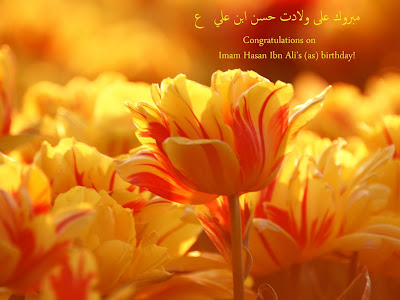


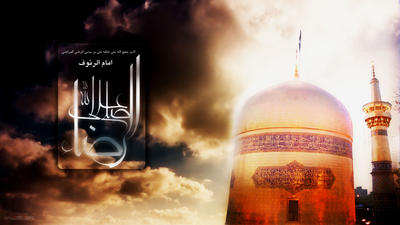
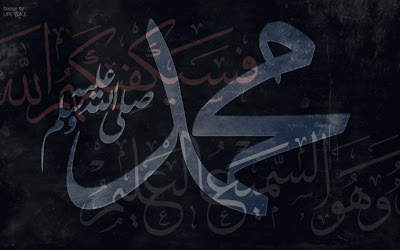


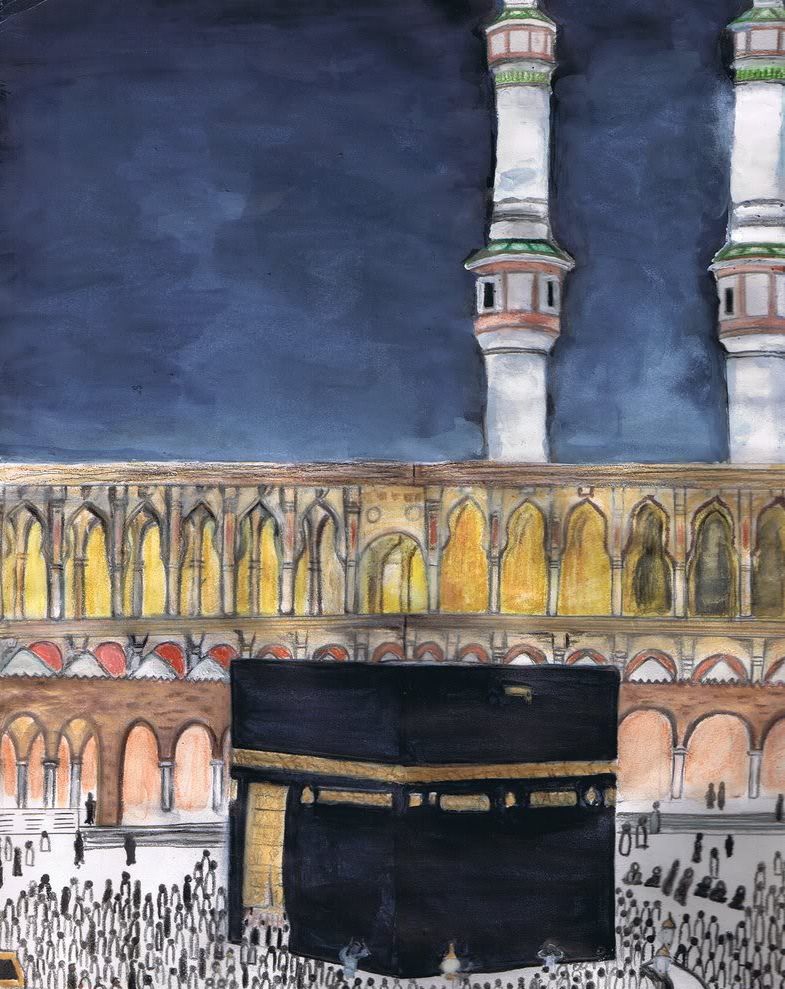



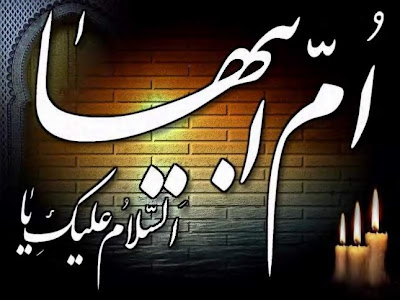
 4:35 PM
4:35 PM
 Warriors of Imam Mahdi (a.s.)
Warriors of Imam Mahdi (a.s.)

 Posted in:
Posted in: